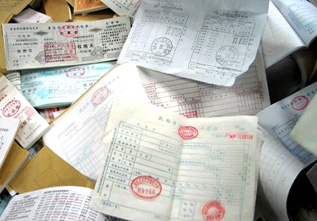| Home / Government / Focus News | Tools: Save | Print | E-mail | Most Read |
| Gov't Tightens Management on Invoices |
| Adjust font size: |
The Chinese government is amending its regulations on invoices, clarifying the definition of malpractice and increasing penalties, to close loopholes for tax evaders. The State Council on Monday published a draft amendment to the regulation on invoices to solicit public opinion.
The present regulation, adopted in 1993, needed updating according to social changes and taxation reforms, said a statement issued by the Legislative Affairs Office of the State Council. Since China's taxation system had changed in recent years and new laws were issued, some items in the present regulation were no longer appropriate, the statement said. "They did not cover many new forms of malpractice either," it said. The draft amendment details more forms of malpractice related to invoices, increasing the number of items from six to 12. The draft amendment specifies violations, including: -- failing to record the true information of the transaction for the buyer; -- failing to record the true information of the transaction on the seller's copy; -- requesting false information on an invoice; -- conspiring by third parties to falsify invoices. The draft amendment also increased the maximum fine from 50,000 yuan (US$6,500) to 100,000 yuan (US$13,000). The current regulations specify two ranges of fine: below 10,000 yuan (US$1,300) and from 10,000 to 50,000 (US$1,300 to 6,500). The draft amendment has five ranges: below 2,000 yuan (US$260); 2,000 to 10,000 yuan (US$260 to 1,300); 10,000 to 30,000 yuan (US$1,300 to 3,900); 10,000 to 50,000 yuan (US$1,300 to 6,500); and 10,000 to 100,000 yuan (US$1,300 to 13,000). The government has implemented policies to curb the tax evasion through invoices, including requiring shops, supermarkets and restaurants to use special cashiers to make sure every deal recorded for revenue authorities regardless of whether an invoice is made or not. (Xinhua News Agency July 31, 2007) |
| Tools: Save | Print | E-mail | Most Read |
| Related Stories |
|
|
||||||||||||
|
| Links | |||||||||||
|
